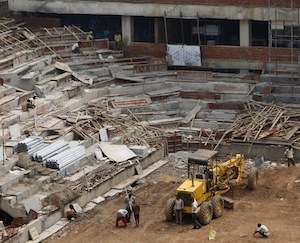
Laborers work at Shivaji stadium, one of the practice venues for the upcoming Commonwealth Games, in New Delhi, India, Tuesday, Aug. 17, 2010. (AP Photo/Saurabh Das)
Dark clouds are hovering over Delhi and the Commonwealth Games – in more ways than one – as preparations for the Games, just over a month away, lumber dangerously behind schedule and the seeds of disinterest grow.
Numerous reports have emerged from Delhi about the readiness and quality of the Games’ infrastructure, and there appears to be genuine concern that numerous sites won’t be up to a suitable standard by the October 3 opening.
According to an Australian Associated Press (AAP) report this week, “The Indian government has missed a deadline to certify all Commonwealth Games sporting venues are structurally sound and safe.”
The monsoonal rain that has lashed southern Asia has complicated and delayed the mad rush to be ready.
Former Indian cricket captain Bishen Bedi has called on athletes to boycott the Games as a result of this preparation and the controversy over corruption which has engulfed organisers.
But of more concern are the reports of the conditions workers are subjected to at these stadiums.
(For an eyewitness account of those conditions, read Jessica Halloran’s article in The Daily Telegraph.)
Is it right that Australia, and the rest of the Commonwealth, commit to competing at the Games considering the mounting evidence of corruption and the treatment of the workers?
It’s certainly worthy of the debate, as is the issue that’s causing most concern – security for participants.
Dawn Fraser recently raised the spectre of a 1972 Munich Olympics-type attack, urging athletes to consider boycotting the Games.
Slightly alarmist perhaps, but her warning has merit.
According to the Australian government’s travel advisory, travellers should “exercise a high degree of caution in India at this time because of the high risk of terrorist activity by militant groups.”
Whether athletes should boycott the Games or not is a thorny issue. We must respect the decision of individuals and trust the Australian government and officials have done their due diligence.
But the concerns over safety and infrastructure only mask the questions about the relevance of the Games and the growing ambivalence toward the Commonwealth.
Even in India the Games are, seemingly, a hard sell.
According to AAP, only two percent of tickets have been sold – around 50,000 tickets from a total of 2.3 million available.
With Australia’s cricket tour clashing with the Games, Sachin Tendulkar and co are set to steal a large chunk of the limelight.
In Australia it’s hard to find any genuine excitement around the Games, no matter how hard Channel 10 and Foxtel try and sell it.
With Australia’s “Golden Girl” Stephanie Rice absent, Usain Bolt, the undisputed star of the Commonwealth, not bothering, Lleyton Hewitt and Samantha Stosur missing tennis’ Commonwealth debut because of schedule clashes with tour events (in other words, representing Australia at the Commonwealth isn’t as luring as their day job), there is hardly much star power to get excited about.
Without wanting to insult athletes competing at the Games, particularly those competing in sports who cannot represent their countries at the Olympics (think netball), the Commonwealth Games are no longer relevant.
They, along with the Commonwealth itself, are an archaic remnant of the British empire.
(For a background on what the Commonwealth is and does, read this article.)
With renewed calls from the incumbent Prime Minister Julia Gillard for Australia to revisit the Republic debate, it’s worth asking whether the Games have a future in our sporting portfolio.
The history of the Commonwealth Games for Australia is of us beating up on England and the rest in the medal tally. You sense this perverse enjoyment in whipping the floor with our “opponents” is one of the few reasons why we’ve been able to justify the Games for so long.
Great sporting moments perhaps, but it no longer matters when we have been testing ourselves against a far greater pool of talent at other major sporting events, and the disinterest from athletes and sporting fans alike tells us it’s time to move on.
With the rise of continental international competitions, such as the Asian Games, how can the Commonwealth Games continue to be a meaningful sporting contest when the Commonwealth itself is such a facile being?
The sporting rival between Australia and its mother country better manifests itself in other arenas, namely the Ashes. As does the rivalry between us and the Kiwis, through the Bledisloe Cup.
At a time when Australia needs to be integrating more diligently with Asia, be it in the sporting environment and more, we should be moving away from the old world Commonwealth and start embracing our true place in the world – as an Asian Pacific country.
An unsuccessful Delhi Games will only intensify the relevance debate and could herald the beginning of the end for the Commonwealth Games.





























































































